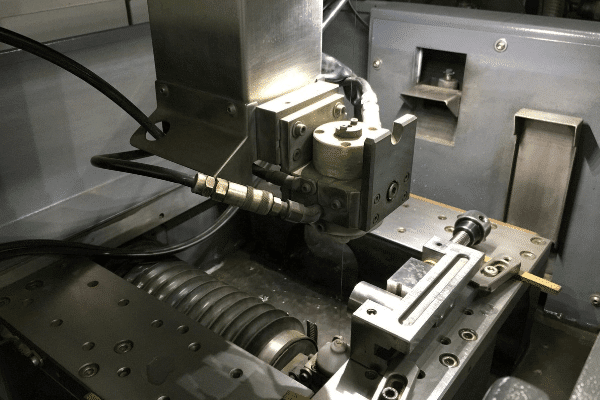Electroerosion machining is a technology that allows difficult and precision work to be carried out that was previously almost impossible. It is a type of machining by removal that is applied to electrically conductive materials, such as steel and other metals, alloys, graphite or ceramics. Electroerosion machining is also known as spark erosion and EDM machining.
In this article we go deeper into this type of machining, which makes it possible to manufacture from holes of almost any shape, to forging dies, steel molds for molding machines, to tools for making complicated arrays and stamps.
What is Electroerosion?
Electroerosion machining is a type of removal machining that is carried out with electrical processes. This technique, also known as Electrical Discharge Machining (EDM), is based on the removal of electrically conductive materials by means of a series of electrical discharge processes between two electrodes in machines designed for this purpose.
Electroerosion machining is considered a non-traditional method of material extraction, as opposed to the more common methods that use mechanical forces.
To validate electroerosion machining parts for certain more demanding uses, it is possible to evaluate factors such as determining the critical corrosion failures that this metal could suffer by testing in a climatic chamber.
Origins of electroerosion
The origins of this technique date back to the times of the former USSR, where the Lazarenko couple of scientists developed this technique, which was activated during the Second World War. According to the book ‘Electromachining: Electroerosion and electrochemical machining’, this technology remained unknown until the 1950s, when it became of interest to the industrial world, especially in the United States, where it developed rapidly thereafter.
What materials are used for EDM machining?
Steels (carbon, alloy, stainless…), castings, metals and refractory alloys, graphite and synthesized carbides, among others, are used.
What are the most common uses of electroerosion?
- Row manufacturing
- Lathe and milling tools
- Dies
- Mould
- Stamping tools
- Metal powder compacting tools
- Molds for plastics, glass or rubber
- Pressure molds
What are the advantages of electroerosion machining?
Application on electrically conductive materials
One of the major advantages of EDM machining is that it can be applied on all materials that are good conductors of electricity, regardless of their hardness. Therefore, it is used to machine hard metals or hardened tool steels, avoiding deformations and cracks.
No contact with the workpiece
The process does not touch the part to be machined, so the usual forces that occur in machining processes and that can affect the parts, such as chip removal or deformation, do not appear.
Completely finished parts
It is possible to completely finish a part with electromachining, thus avoiding the need for manual backworking and extending the service life of the parts.
Manufacture of complicated parts
The precision of electroerosion machining makes it possible to produce parts with complicated shapes and small thicknesses. Depending on the quality of the machine, all types of regular and irregular parts with narrow dimensions and very fine surface finishes can be cut.
Types of electroerosion
1. Wire electroerosion
The electrode is a metal wire that produces the erosion on the contour that has been programmed for the part. The key materials in the wire electroerosion machine are the single-use brass wire, usually 0.25 mm in diameter, and the dielectric, deionized water, which is injected into the erosion zone.
Wire electroerosion is used to erode prismatic parts with straight and conical profiles.
2. Penetration electroerosion
Penetration electroerosion reproduces the shape of the electrode, i.e. the tool used, on a part. These electrodes are usually made of copper or graphite.
For example, with a penetration electroerosion machine, it is possible to make anything from a mold for a glass ashtray to a mold for the manufacture of plugs.
Do you need to “ground” a product? At INFINITIA Industrial Consulting we are experts in materials innovation and we will help you find the best solutions within the engineering and R&D framework. We listen to you.

